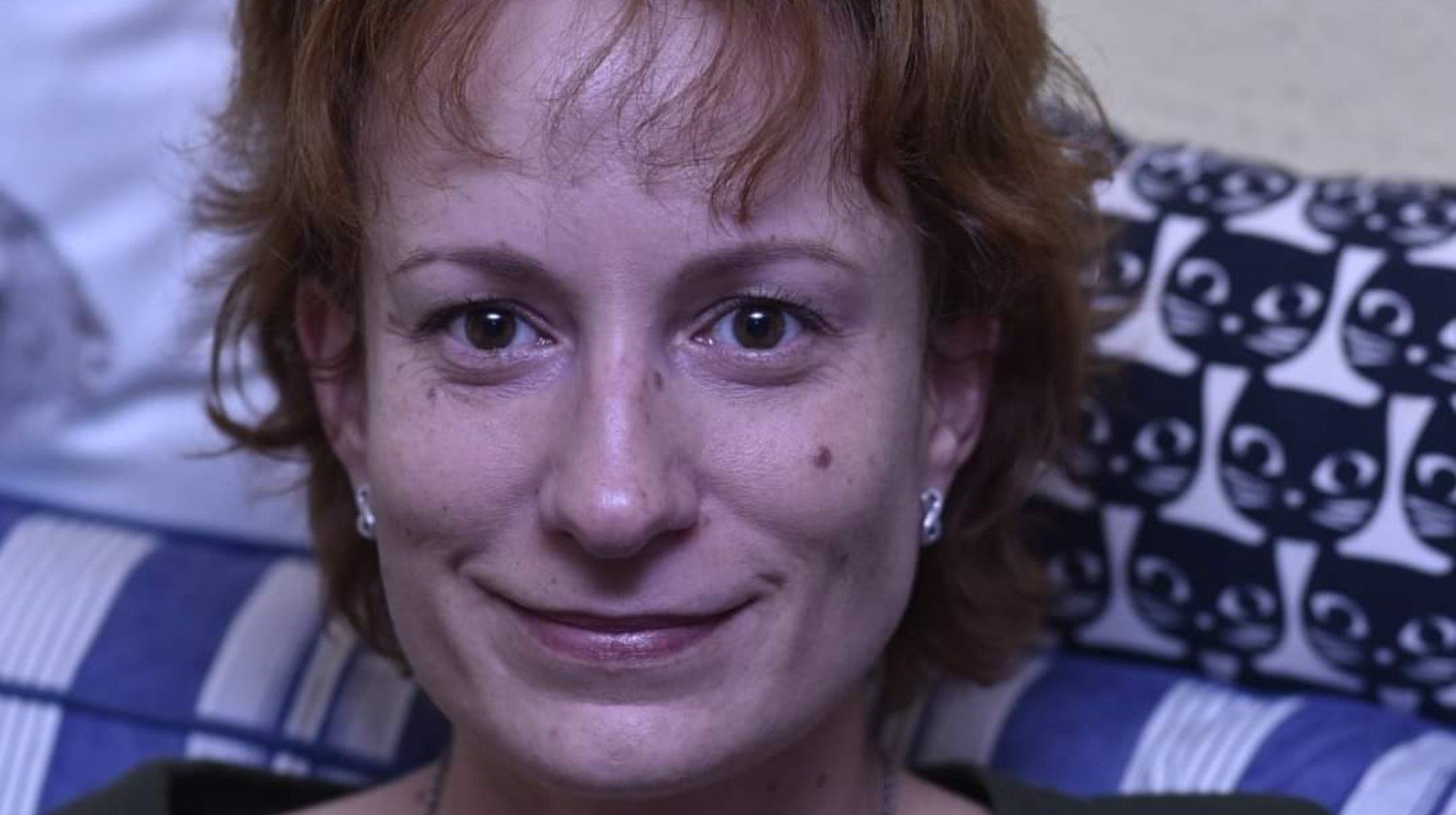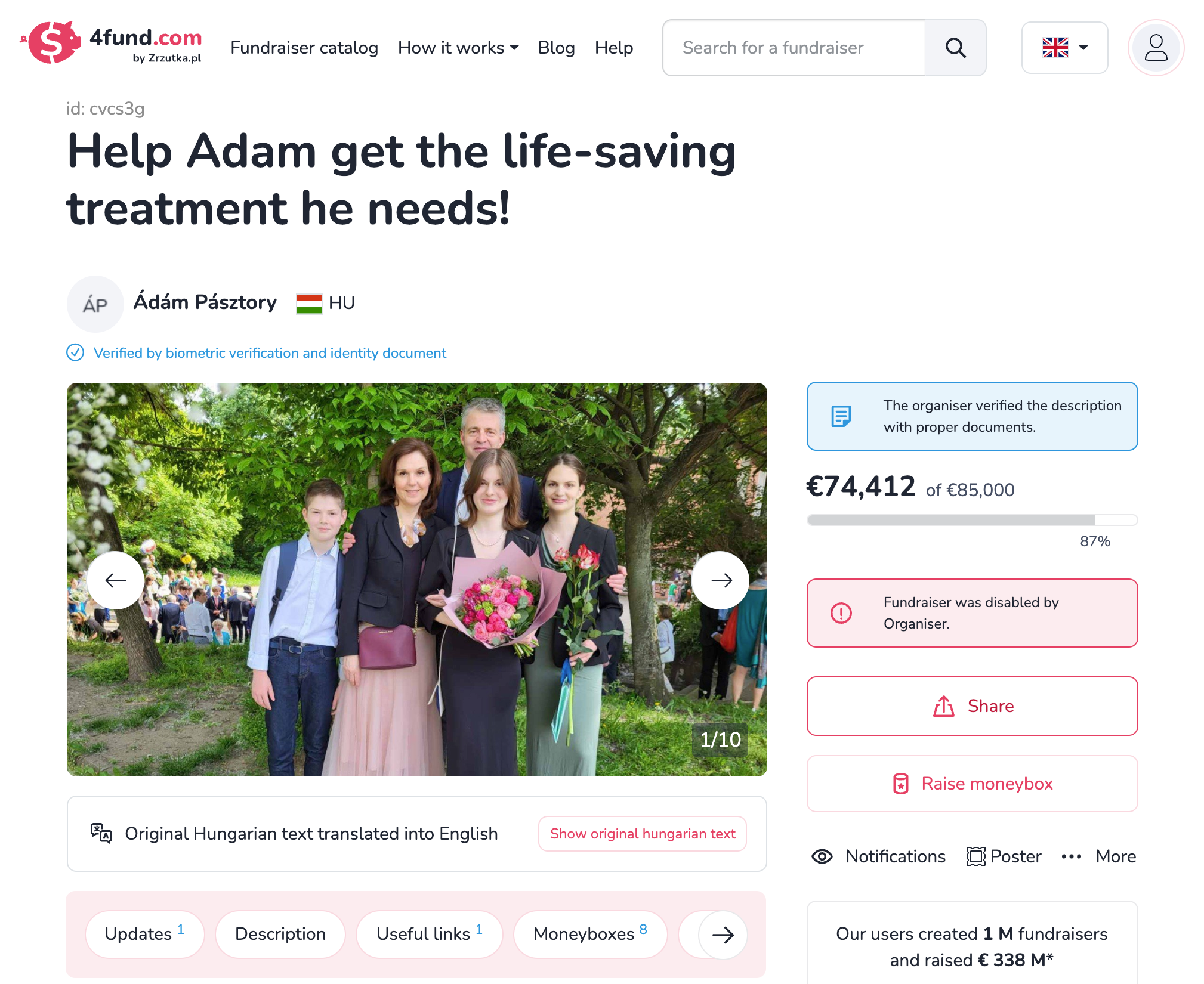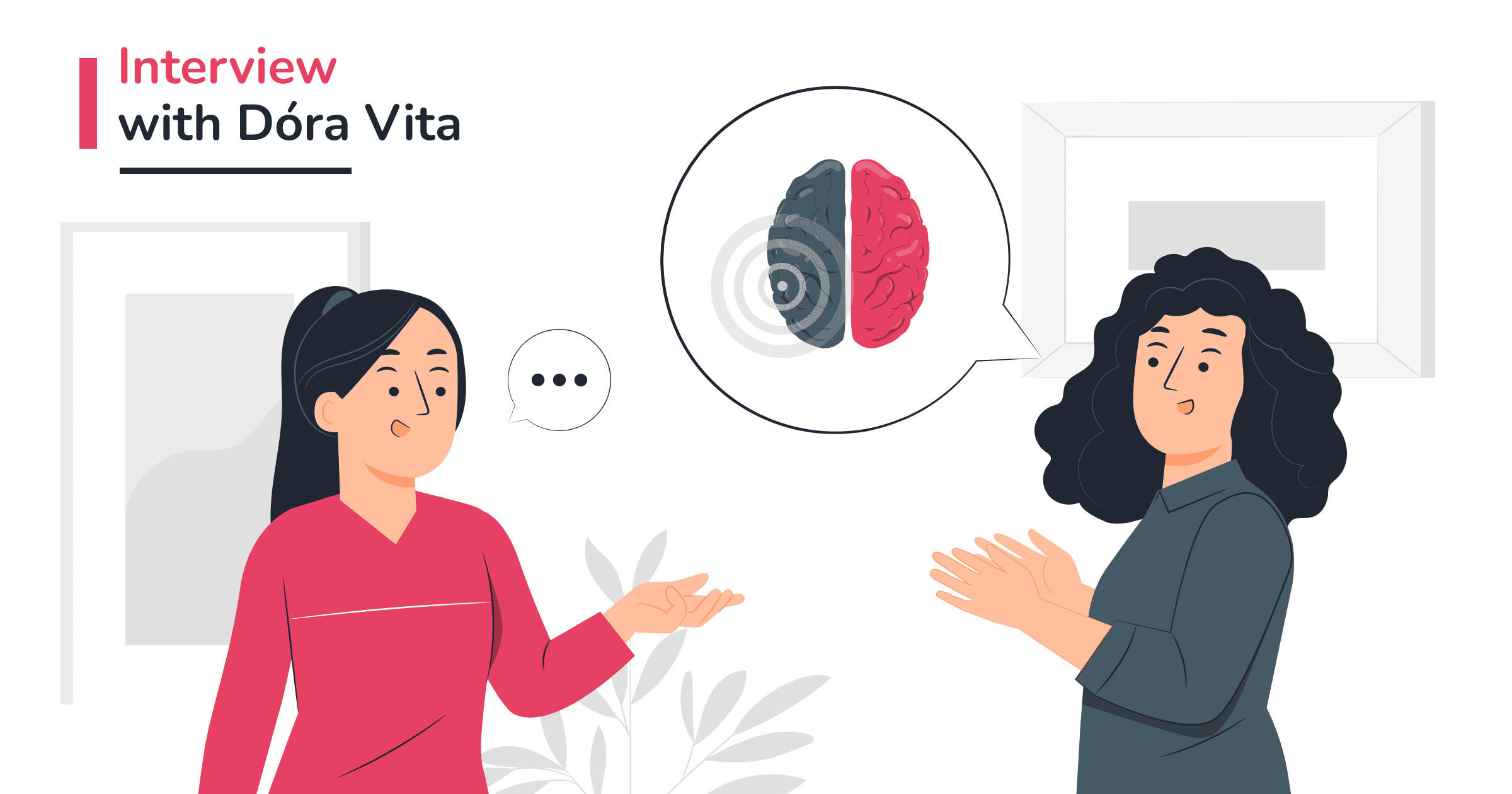Do you need help covering medical costs? Dóra did too – until she raised over €56,000 in just 15 hours! Read this interview to learn how she did it and how 4fund.com can help you fundraise for treatment.
Dóra Vita is a 47-year-old woman from Hungary whose life changed overnight. She felt completely healthy – until one day she suddenly found herself on an operating table. Then came the devastating diagnosis – glioblastoma multiforme, one of the most aggressive brain tumours. And then – another blow. This type of cancer isn’t treatable in her country…
Despite the shock, Dóra didn’t give up. While she was looking for solutions, the best one came to her on its own – from next door. It was Ádám Pasztory who helped her – he had also struggled with what Dóra was going through, but thanks to a fundraiser on 4fund.com, he managed to raise the money he needed for therapy. She followed his lead and launched a fundraiser – and in the blink of an eye, raised everything she needed.
Curious how? We asked her to share the story behind her incredible fundraising success – read this interview to find out!
How to raise money for a life-saving treatment? An interview with Dora Vita
Aleksandra: How are you feeling after everything you've been through recently? Is your treatment going well?
Dóra: Thank you, I'm doing well. Of course, the treatments and medicines have side effects, but I’m not complaining. Compared to the circumstances, I really do feel good. I never used to take any medicines, so I still have to get used to it and consciously make sure I take everything on time, plan ahead, and take what I need with me when I go somewhere.
The radiation therapy was tough – for six weeks, I had to go to the Oncology Institute every weekday. It was mentally taxing too. My hair fell out, even though it had finally started growing back after the surgery. It’s not like I had a luscious mane, but I still miss it. Also, it’s not pleasant to lie motionless on a table with your head strapped in a plastic mask – even if it’s only for a short time. Sometimes it felt a lot longer than just two and a half minutes. Radiation also causes brain edema, which mimics the symptoms of the disease itself. Even though the doctors warned me about this, it was still scary at times. I had to fight off a few anxiety attacks, but I kept telling myself I had to get through it.
My chemotherapy continues until the immunotherapy shows measurable results and my doctors say I can stop. The full cost of the immunotherapy has been transferred to the clinic, and the vaccine is currently being manufactured. It should be ready by the end of May or beginning of June, and then I’ll receive the first treatment in Vilnius.

Dóra Vita (source: https://4fund.com/zzhxpk)
A: Could you tell us a bit more about your brain tumour diagnosis and how you discovered the treatment option in Germany?
D: Glioblastoma multiforme is one of the most aggressive forms of brain cancer. Most patients don’t survive more than a year after diagnosis, even with surgery, radiation, and chemotherapy. This tumour doesn’t respond well to current treatments. It spreads rapidly to surrounding brain tissues. The symptoms show up late, and brain surgery carries serious risks. I saw someone my age suffer complications after surgery and not recover. That made me realize how lucky I was.
I had felt fine before the diagnosis – no symptoms. I was baking for Christmas, and by mid-January I was on an operating table. In the final two weeks before diagnosis, I started noticing something was wrong, but never imagined it was a brain tumour. There’s no early screening for this. Thankfully, the neurosurgeon who operated on me told us about the immunotherapy. He even asked me not to read the pathology report alone and to wait for him. I sent it unread to my mum and partner, Péter, because they insisted on seeing it. I could tell from their reactions that it was serious. I thought I had six months left – so hearing that it could be even 18 felt like a relief! Sadly, many patients never hear about this therapy. They’re sent home with 15 months to live. It’s horrible. This treatment is expensive and won’t be accessible to everyone, but knowing it exists gives hope. It should be talked about more because it’s not just for glioblastoma – it can work for other cancers too. I talked with Ádám Pasztory, and we agreed that we should start a campaign to raise awareness about it. It’s still relatively new, but some cases show six years of survival.
A: You mentioned that Ádám Pásztory told you about the treatment in Germany. What role did his story play in your decision to start a fundraiser?
D: After my diagnosis, my partner began researching the immunotherapy treatment mentioned by my doctor. We only knew that it was available at a centre in Tübingen. That's how we found Ádám, who, as it turned out, lives only a few tram stops away from us. I’m incredibly grateful to him – he gave us the contact we needed to start the process. We also discovered your fundraising site through his story.
Since then, I’ve been contacted by about one person a week – either patients or their relatives – who saw my story. Now I can help them and give them hope. Ádám’s success gave me strength: he managed to raise €80 000 for the treatment. At first, I hesitated to go public – I don’t like complaining or being in the spotlight. But I realized my life was on the line, and I had to try everything I could. If that meant asking for help, then so be it.
I’ve supported similar fundraisers in the past and always did so gladly. People are fundamentally good and often do want to help. Ádám didn’t give up – and that’s the only way. You have to believe it’s possible!

Ádám Pásztory’s fundraiser (source: https://4fund.com/cvcs3g)
A: Over 2,500 people supported your campaign in just 15 hours – that’s incredible! What was it like to watch the donations come in, especially from people you didn’t even know? Did you expect such a response?
D: To be honest, I never imagined this even in my wildest dreams. My partner Péter and I were sitting in front of the screen, eyes wide open, just watching the numbers go up. We’ll never forget that moment. To this day, I don’t know how I deserved the support of so many people. I’m incredibly grateful and hope that someday I’ll be able to repay this kindness. What really stood out was the amount of love and encouragement I received. Strangers were cheering me on, and it truly felt like a miracle. If it hadn’t happened to me, I probably wouldn’t believe it myself.
Beyond my family and friends, even former and current colleagues, bosses, and neighbours came together to form a massive support network. Their love was almost tangible. I’d highlight two extremes: one friend transferred 1 million forints within 15 minutes, while another gave their last 270 forints. I don’t cry easily, but Péter and I couldn’t hold back tears of joy.
A: What steps did you take to promote your campaign and reach such a wide audience? Was there anything in particular that worked really well?
D: I shared my story on my personal social media account, and within just a few hours, it reached tens of thousands of shares. I think a big part of the success was that many of my friends added personal notes when they shared it, making it more credible for their own networks. I’m truly lucky to have such friends, and I hope I’ve earned their love and trust.
I posted the story in the afternoon, and by the next morning, we had to figure out how to stop the campaign quickly because we had already reached the target amount. Even days later, people kept reaching out saying they wanted to help but couldn’t anymore. I asked them to donate the amount they had planned to someone else in need, because unfortunately, many others are still waiting for help.
A: Your fundraiser looks beautifully done – full of heart. Did you create it all yourself, or did you get help from friends or fundraising experts?
D: I wrote the post myself, which is probably why it came across so sincerely. I believe the most authentic way to talk about your situation and feelings is to speak from your own perspective. Once I finished, I asked Péter and a few of our friends to read it and give feedback. I made a few edits based on their input, but overall, not much changed. One friend said the post radiated love for life – and I’m glad that came through.
The 4fund.com platform was a huge help. When we registered, we realized how rigorous the verification process is. No matter what you’re fundraising for, the story has to be real, backed by documentation. I found it reassuring to know that real fundraisers on the site are legitimate and not scams. I even found my story reposted under a different name with slightly altered text – but luckily, the person hadn’t passed the verification process, so it wasn’t active.
A: In your campaign, you mentioned planning to cook your brother’s favorite fish dish for his birthday – that’s so sweet! Were you able to do it? Do you have any other dreams or goals you’re excited to pursue?
D: My brother Ágnes didn’t have the best luck this year. His birthday is April 20, which coincided with Easter, so the bunny kind of stole his party. But don’t worry – I made his favorite catfish stew early, in February, and he thoroughly enjoyed it.
Right now, my main focus is to fully recover, and everything revolves around that. Once I reach that point, I’ll set new goals – because having goals keeps us going. My life probably won’t go back to how it was before the illness, but that might not be a bad thing. When something like this happens, it makes you reflect and reevaluate everything. Sure, I’d love to have the carefree days back, but life is always changing, and we have to adapt. Sometimes we only understand why things happened after the fact, when we can see the bigger picture. I’m sure I still have a purpose, and the direction will become clear in time. One thing is certain – I want to keep helping animals in need. Right now, we live with six rescued cats and two bunnies, but I always seem to stumble upon new rescue cases, so I know there’s more to do.
A: If you could give one piece of advice to those struggling with brain tumour or other serious illnesses – what would it be?
D: You must not give up or let yourself fall apart. Our bodies have an amazing ability to heal and regenerate – more than I ever imagined. For example, the day after I got home from the hospital, I went for a walk with my partner. Sure, I had to hold onto Péter’s arm, and I got tired after about half an hour, but I went. And after that, I kept going – every day, a little more. I could truly feel myself improving day by day. Even with the simpler things, like hanging the laundry or doing the dishes – I practiced those from the start, because I wanted to regain the ability to do everything on my own again, just like before.
I’m lucky to have a wonderful family and partner. I follow the recommended sugar-free and reduced-carb diet, and I spend a lot of time outdoors, in nature – all of these things are healing. It’s also incredibly important to have a supportive environment. And if you don’t have one, try to find people who will truly stand by you through thick and thin. My mum, for example, accompanied me to every treatment and blood test every week. She would drive one and a half hours just to be with me – always bringing her “bottomless” basket full of all sorts of delicious things. To this day, I don’t understand how she managed to fit so much into that little basket!
We also need to learn to notice the little joys and beauties of life – because there are so many. We just tend to pass them by. Life is beautiful at its core, even if it comes with a bit of hardship now and then.
Fundraising for medical treatment
If you or a loved one is going through a difficult time – whether due to illness or a sudden financial crisis – crowdfunding can truly make a difference. It’s a powerful way to reach out and receive support from people who care. On 4fund.com, you can start a fundraiser for yourself or on behalf of someone dear to you – and raise the needed funds quickly and easily.
Ready to take the first step? Share your story and let your voice be heard.
Create a fundraiser - for free, no fee!
Create a fundraiser - for free, no fee!
Asking for help can be hard, but remember – you’re not alone. Starting a fundraiser gives others the opportunity to stand by your side. You’d be surprised how many people are ready to offer their support. Thousands of users have already taken this step – and many found not only financial assistance, but also kindness and solidarity from strangers.
On 4fund.com, many fundraisers have already been created for brain tumour treatment. You can read more about these cases on our blog.



